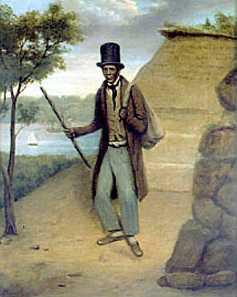John Caesar escaped slavery in the Caribbean, only to be convicted of stealing £12 in Deptford and transported to New South Wales in 1789. There, although known as a hard worker, he continued to commit thefts motivated by hunger. He escaped to the bush with a musket and cooking-pot, but couldn't find enough game to feed himself. Instead, he resorted to stealing food - and was caught in a matter of weeks. Sent to Garden Island to work in fetters, he was soon allowed to work unchained thanks to his good behavior - and escaped once more, returning to the mainland in a stolen canoe. This pattern of theft, capture and escape was repeated several times, until in 1795 he formed a gang of runaways. A reward was now offered for his capture, and an attempt at capturing him ended in his being shot and killed in 1796.
Despite this difficult life with its unfortunate end, Caesar became famous as Australia's first bushranger. These runaway outlaws have taken on an ambivalent status in Australian history, with many viewing them as romantic rebels; while others such as Ned Kelly are better-known, Caesar was the first of them.
 In contrast, Billy Blue would achieve success in Australia. He had worked in Deptford as a sugar lumper (labourer) - but his employers were unwittingly providing one of the key ingredients for his other work as a chocolatier. When he was caught and convicted, his sentence was transportation.
In contrast, Billy Blue would achieve success in Australia. He had worked in Deptford as a sugar lumper (labourer) - but his employers were unwittingly providing one of the key ingredients for his other work as a chocolatier. When he was caught and convicted, his sentence was transportation. In Sydney, Blue became a ferryman who took passengers across Sydney Harbour. He was very popular, and became a water bailiff responsible for watching for smugglers. Unfortunately, within a year he was accused of smuggling liquor himself; his explanation that he had found it floating in the harbor and was just bringing it ashore wasn't believed. He lost him his official position as a result; there would later be other brushes with the law; but he continued to enjoy support from the authorities. He also had financial security, since in 1817 Governor Macquarie had granted him 80 acres of land in perpetuity. Today, that land in North Sydney is still known as Blues Point.
There are more Black History Month events running throughout October, including an evening with S I Martin and performance poet El Crisis on Thursday - click here for the full programme.
Image: portrait of Billy Blue by T B East, 1834, from Wikipedia.

